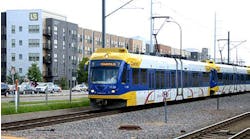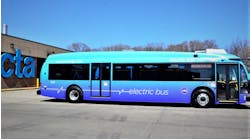The Metropolitan Council Chair Adam Duininck, transit advocates, business groups, and local officials have urged the House leadership to withdraw their proposed legislation and pursue a sustainable fix to transit funding in the Twin Cities metro region.
Bus, light rail, and Metro Mobility services for the elderly and disabled in the Twin Cities will suffer significant service cutbacks and fare increases under legislation introduced by leaders in the Minnesota Legislature. The House Transportation Omnibus Bill (HF 861) proposes to drastically cut funding for Metro Transit, the largest transit provider in the Twin Cities. After accounting for a proposed fare increase, HF 861 balloons Metro Transit’s budget deficit to more than $125 million over the next two-year funding cycle.
The proposed cuts would result in devastating reductions in local bus and rail service. “If Republicans in the legislature short-change transit, our only alternative will be to shrink the Metro Transit service area and reduce the number of hours the system operates at the same time we dramatically increase fares. The people who rely on transit to get to work, school and personal activities will pay the biggest price as we reduce service hours, routes and destinations,” said Adam Duininck, chair of the Metropolitan Council, which operates Metro Transit.
“To make up a deficit of that size, we will be forced to cut service by 40 percent. The service cut will be bigger if we don’t pass a fare increase this year,” continued Duininck.
The House proposal cuts general fund appropriations to regional transit by $120 million, and completely eliminates state general fund contributions by 2021. It also divests the state from its previous agreement to pay part of the operating cost of the metro’s two light rail lines, shifting that funding burden to metro counties.
Those counties currently have a joint operating agreement to levy a quarter-cent sales tax to build new transit lines and then pay part of the cost of operating them. Duininck says the $50 million shift will make it almost impossible for the counties to build new transitways in the future.
“The state legislature is grabbing local tax dollars that were raised for one purpose and then spending them for another,” said Peter McLaughlin, Hennepin County commissioner and chair of the Counties Transit Improvement Board, which invests in metro area transit projects. “This action is gutting our ability to expand our transit system and meet the region’s needs.”
Transit advocates and business leaders say cuts on this level will have a ruinous impact on the region’s competitive advantage and quality of life. Ridership surveys by Metro Transit find that 80 percent of rides taken on the transit system are by people commuting to work or school. Dramatic cuts to metro area transit will have a direct impact on local businesses that rely on workers to arrive on time, and students who need to get to classes.
“We have been urging legislators to enhance our transit system because it brings people to work and attracts talent to our region. This is a step in the wrong direction,” said Minneapolis Regional Chamber of Commerce President and CEO Jonathan Weinhagen. “This is going to harm hundreds, if not thousands, of businesses who rely on transit to get their employees to work on time and to bring customers to their businesses. Forty percent of the workers in downtown Minneapolis get to work on transit. Cut back on buses and employers will be forced to move out of our city just to ensure employees can find a place to park.”
The cuts will also fall on those who are transit-dependent, as well as those who regularly use the Metro Mobility service for people with disabilities. The House bill did nothing to address a projected shortfall in that program, which has been caused by increasing demand. Currently, 20,000 Minnesotans with disabilities use Metro Mobility. As the region’s population ages, ridership on Metro Mobility has grown by 5 to 8 percent a year, and there is no sign it will let up in the future. Federal and state law require that the service provide rides to eligible individuals, regardless of growth in demand or cost. Metro Mobility’s service area and hours of operation are minimally defined by law, although Metro Mobility currently provides more services than the legal minimum.
“The disability community was not consulted about this bill,” said Kjensmo Walker, who chairs the Metropolitan Council’s Transportation Accessibility Advisory Committee. “For many people with disabilities, transit is a lifeline, it’s how they get to work, school, doctor appointments and connect with the community. Whether it’s a service like Metro Mobility, or regular route bus service, transit is vital to our community.”
Duininck, transit advocates, business groups, and local elected officials urged the House leadership to pursue a fix to transit funding along the lines of the regional sales tax proposed by Governor Dayton. Governor Dayton’s half-cent sales tax proposal would fully fund transit operations in the region, as well as expand transit service and hours of operation. Governor Dayton’s plan, calls for an investment in roads, and transit in both metro and Greater Minnesota.



